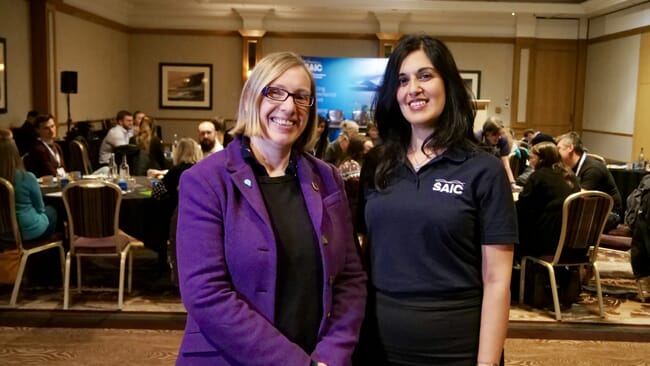
According to SAIC, it has equipped 200 academics with the skills to thrive in the seafood industry, including MSc scholarships, PhD funding and paid work-placements. Its programmes have also upskilled a further 294 private sector workers and university researchers through a range of mentoring initiatives, leadership courses, and digital skills training.
SAIC's future is in doubt after the Scottish Funding Council (SFC) rejected the organisation's application for a new grant, but the organisation has vowed to continue, albeit in a pared down form. However, despite the uncertainty, SAIC recently hosted a Nurturing Talent in Scottish Aquaculture event, which showcased the diverse initiatives in place to upskill the existing workforce and support the next generation of talent.
Jillian Couto-Phoenix, head of skills at SAIC, and Alison Gray, founder and director of Skillfluence, delivered the welcome address, highlighting the importance of skills and knowledge exchange in driving innovation with impact and safeguarding a sustainable future for the sector.
Up next was a leadership showcase, which involved a reflective Q&A session with a group of individuals who took part in SAIC’s nine-month leadership cohort. This was followed by a fireside chat with a panel of early to mid-career professionals who discussed their personal experiences and successes from the innovation centre’s various skills initiatives.
The event concluded with an open discussion on the power of mentoring programmes, shining a light on the Women in Scottish Aquaculture (WiSA) network and its impact on encouraging more women to enter and progress in the sector.
Heather Jones, CEO of SAIC, provided the closing remarks and encouraged the room to take advantage of the numerous collaborative working groups and partnerships that are helping to drive the whole sector forward.
Couto-Phoenix said: “Over the last ten years, SAIC has existed primarily to connect industry needs with academic expertise via a portfolio of research and development. However, to facilitate the sharing and translation of this knowledge into new and improved practices, a connected pipeline of talented individuals is needed to turn these ideas into reality. Therefore, alongside our research and development, SAIC has been nurturing talent by creating cohorts of professionals from across organisations within the aquaculture sector with the purpose of innovating, leading and guiding careers.
“It was energising to hear from professionals from across a range of disciplines, telling us that our programmes have helped them to develop key skills which they have implemented at work and seen positive results. The keystone is consistent funding for skills and talent programmes – something a sector with big plans to grow and scale needs to bump up the list, given the demonstrable positive effect.”

